Search
Remove Ads
Advertisement
Summary 
Loading AI-generated summary based on World History Encyclopedia articles ...
Search Results
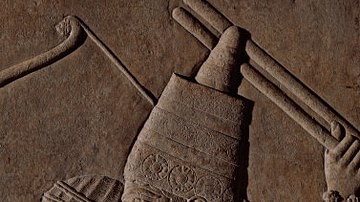
Definition
Ashurbanipal
Ashurbanipal (r. 668-627 BCE, also known as Assurbanipal) was the last of the great kings of Assyria. His name means "the god Ashur is creator of an heir" and he was the son of King Esarhaddon of the Neo-Assyrian Empire. In the Hebrew Tanakh...
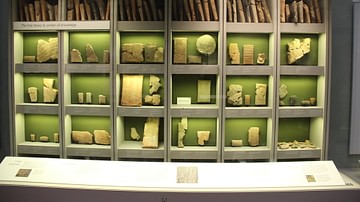
Definition
Library of Ashurbanipal
The Library of Ashurbanipal (7th century BCE) is the oldest known systematically organized library in the world, established in Nineveh by the Neo-Assyrian king Ashurbanipal (r. 668-627 BCE) to preserve the history and culture of Mesopotamia...
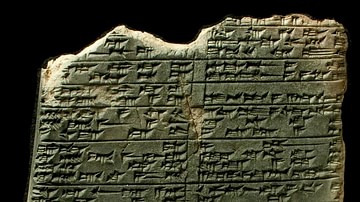
Article
Ashurbanipal's Collection of Sumerian and Babylonian Proverbs
Ashurbanipal's collection of Sumerian and Babylonian proverbs formed part of the famous Library of Ashurbanipal (7th century BCE) established at Nineveh for the express purpose of preserving the knowledge of the past for future generations...

Definition
Sargonid Dynasty
The Sargonid Dynasty was the last ruling house of the Neo-Assyrian Empire from 722-612 BCE, beginning with the reign of Sargon II and ending with fall of the Neo-Assyrian Empire. Some of the most famous kings in the history of Assyria come...
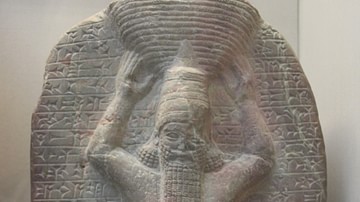
Image
Ashurbanipal as High Priest
Stone stela of Ashurbanipal, the king is shown with a ritual basket of earth on his head as the royal builder for the accession of Shamash-shum-ukin and the restoration of Esagil, the sanctuary of Marduk in Babylon. Cuneiform inscription...
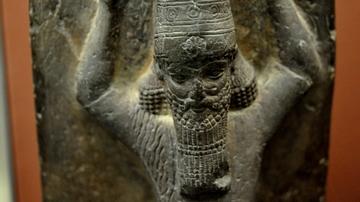
Image
Ashurbanipal II
A close-up image of a red sandstone stela depicting the Assyrian King Ashurbanipal II. The king holds a ritual basket of earth on his head (not shown here) for the rebuilding of E-Zida temple. Neo-Assyrian Period, 668-655 BCE. From the temple...
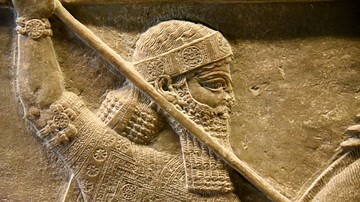
Image
Ashurbanipal II
This is a detail of a large wall relief of the so-called Assyrian lion-hunting scenes. This is the Assyrian King Ashurbanipal II. The King holds a long spear and is about to thrust it into a rearing lion's mouth (not shown here). Note the...
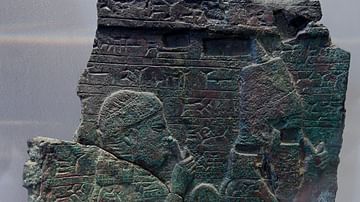
Definition
Zakutu
Zakutu (l. c. 728 - c. 668 BCE) was the Akkadian name of Naqi’a, a secondary wife of Sennacherib of Assyria (r. 705-681 BCE). Though she was not Sennacherib's queen, she bore him a son, Esarhaddon, who would succeed him. She may have ruled...

Video
Ashurbanipal Hunting Lions (Assyrian)
More free lessons at: http://www.khanacademy.org/video?v=J5iEY4hapMQ
Ashurbanipal Hunting Lions, relief from the North Palace, Ninevah, Assyrian, c. 645-635 B.C.E. (British Museum)
Speakers: Dr. Steven Zucker & Dr. Beth Harris
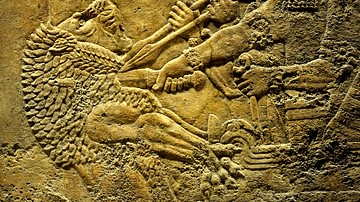
Image
Lion-Hunting Scene, King Ashurbanipal
Sculpted relief illustrating the sporting exploits of the last great Assyrian king, Ashurbanipal, North Palace, room C, panel 20-22, Nineveh, modern-day northern Iraq. Neo-Assyrian Empire, reign of King Ashurbanipal, 668-631 BCE. In ancient...